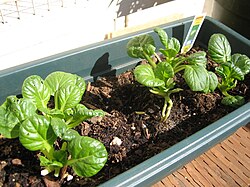塌菜
Appearance
Chinese
[edit]| collapse | dish (type of food); vegetables | ||
|---|---|---|---|
| trad. (塌菜) | 塌 | 菜 | |
| simp. #(塌菜) | 塌 | 菜 | |

Pronunciation
[edit]- Mandarin
- (Standard Chinese)+
- Hanyu Pinyin:
- Zhuyin: ㄊㄚ ㄘㄞˋ
- Tongyong Pinyin: tacài
- Wade–Giles: tʻa1-tsʻai4
- Yale: tā-tsài
- Gwoyeu Romatzyh: tatsay
- Palladius: тацай (tacaj)
- Sinological IPA (key): /tʰä⁵⁵ t͡sʰaɪ̯⁵¹/
- (Standard Chinese)+
- Cantonese
- (Standard Cantonese, Guangzhou–Hong Kong)+
- Jyutping: taap3 coi3
- Yale: taap choi
- Cantonese Pinyin: taap8 tsoi3
- Guangdong Romanization: tab3 coi3
- Sinological IPA (key): /tʰaːp̚³ t͡sʰɔːi̯³³/
- (Standard Cantonese, Guangzhou–Hong Kong)+
Noun
[edit]塌菜
- Brassica rapa subsp. narinosa (syns. Brassica narinosa, Brasica rapa var. narinosa, Brassica rapa var. rosularis), an edible green vegetable known variously in English as tatsoi, spinach mustard, spoon mustard, or rosette bok choy.
Further reading
[edit] Tatsoi on Wikipedia.Wikipedia
Tatsoi on Wikipedia.Wikipedia - Brassica narinosa at Tropicos
- Brassica rapa var. rosularis at The Plant List
- 塌菜 at Brassibase
Japanese
[edit]
Etymology 1
[edit]| Kanji in this term | |
|---|---|
| 塌 | 菜 |
| たあつぁい | |
| Hyōgai | Grade: 4 |
| jukujikun | |
From Mandarin 塌菜 (tācài).[1][2]
Pronunciation
[edit]Noun
[edit]- Brassica rapa subsp. narinosa (syns. Brassica narinosa, Brasica rapa var. narinosa, Brassica rapa var. rosularis), an edible green vegetable known variously in English as tatsoi, spinach mustard, spoon mustard, or rosette bok choy
Etymology 2
[edit]| Kanji in this term | |
|---|---|
| 塌 | 菜 |
| たあさい | |
| Hyōgai | Grade: 4 |
| jukujikun | |
Shift in pronunciation from tātsai above,[2] changing the tsa sound to sa in conformance with native Japanese phonetics.
Pronunciation
[edit]Noun
[edit]- Brassica rapa subsp. narinosa or Brassica rapa var. rosularis, an edible green vegetable known variously in English as tatsoi, spinach mustard, spoon mustard, or rosette bok choy
Usage notes
[edit]The tāsai reading fits into native Japanese phonetics, and may be more common among some speakers. Some sources [1][2] suggest that the tātsai reading might be considered more correct.
Further reading
[edit]References
[edit]Categories:
- Chinese lemmas
- Mandarin lemmas
- Cantonese lemmas
- Chinese nouns
- Mandarin nouns
- Cantonese nouns
- Chinese terms with IPA pronunciation
- Chinese terms spelled with 塌
- Chinese terms spelled with 菜
- Japanese terms spelled with 塌
- Japanese terms spelled with 菜
- Japanese terms read with jukujikun
- Japanese terms derived from Mandarin
- Japanese terms with IPA pronunciation
- Japanese lemmas
- Japanese nouns
- Japanese terms with multiple readings
- Japanese terms spelled with hyōgai kanji
- Japanese terms spelled with fourth grade kanji
- Japanese terms with 2 kanji
- ja:Brassicas

